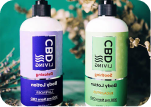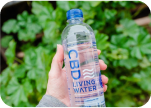
Dirt Mag – Sean McDonald quoted on Farm Bill
Hemp is now legal across the country. After months of speculation about not just whether it would happen but also what would come after, here we are. But what exactly does that mean for CBD and for you as a customer? I talked to experts in the CBD industry, the people who know this stuff inside and out, to find out. They know better than anyone what the passing of the 2018 Farm Bill and the Hemp Act mean for those of us who love CBD massages. (And topicals and edibles and CBD drinks, too.) The overarching theme? Yes, there may be challenges ahead, but the future for cannabidiol, and people who swear by using it, is bright.
It’s only been a month, too soon for most of us to speculate about what will happen to the hemp industry. But that’s why we tapped the experts: Jay Moskowitz, founder and CEO of Bimble (a new sparkling beverage infused with 25mg of full-spectrum CBD); Mike Tatz, co-founder of Resilience CBD; Steven Phan, founder of New York’s experiential CBD store Come Back Daily; and CBD Living COO Sean McDonald. Many of them anticipated the same changes in the industry and benefits for consumers. A couple of them had concerns for the future. Here’s what you need to know, from the people who really know CBD.
When did hemp legalization happen?
President Trump signed into law the 2018 Farm Bill on Thursday, December 20. In it was a provision called the Hemp Act, which allowed for hemp legalization (obviously). That put to an end the legal grey area in which hemp products, like CBD, existed historically. With the surge in popularity of CBD products like lotions, edibles, and drinks, there was a strong call to legalize the plant that produces this non-psychoactive wellness world darling.
Why do the 2018 Farm Bill and Hemp Act matter?
“The passage of the Farm Bill is a huge vote of confidence in the CBD industry from the US government,” CBD Living COO Sean McDonald tells me. Jay Moskowitz, founder and CEO of Bimble, underscored that hemp is “an agricultural commodity that has so many consumer and economic benefits.” He and Mike Tatz, co-founder of Resilience CBD, both emphasized that hemp legalization was especially significant for consumers
McDonald underscored another important issue for the consumers: the health benefits. He’s excited that they’re finally being discussed, and hemp legalization opens the gates for wider recognition. So what exactly does this mean for both you and the industry? Here’s what you need to know about how hemp legalization will affect how you shop for CBD:
You can shop for CBD with more confidence
“Most consumers don’t realize that all CBD is not created equal. Much of the CBD on the market is today is imported, untested and unregulated,” Moskowitz explains. Mike Tatz, co-founder of Resilience CBD, believes that, in some cases, it’s worse than that. “Today, buying quality CBD products can be extremely difficult as ‘fake products’ and misleading product claims are rampant across the industry. This has left many consumers frustrated, confused, and in some cases they have written off CBD all together after having a bad experience,” he says. But whether consumers are simply unaware or see the issues and are frustrated, they’ll all eventually benefit from hemp legalization.
The legalization of hemp comes with strings attached: rules. And although that sounds like just the thing that’s been holding back the cannabis and hemp industries, it’s very good for anyone looking to buy CBD with confidence. Tatz notes that “it won’t happen overnight,” but we’ll see “much more regulation and transparency requirements within the industry.”
And, yes, that might mean a marketplace with fewer companies for a while. The new rules will benefit the consumer by “weeding out the many companies that are selling fraudulent product, not exposing their lab results, and purchasing low quality isolate product internationally,” Tatz notes. (NOTE: There’s a big difference between low-quality isolate and good hemp isolate. Quality products using hemp isolate might be right for you, so don’t write them off just yet.) Moskovitz agrees that “new standards and quality control” will get rid of “shady characters and sub-par products.” But both of them note it’s a very good thing for companies putting out quality products and being transparent with their customers, like both Bimble and Resilience.
Increased regulation of CBD means rules, but that also means standards for the products you’re considering. Experts are excited about the confidence and credibility that could bring to your CBD shopping experience.
Quality products, and more of them
But you won’t just get access to the quality products these companies are already putting out. New brands will also pop up, as long as they hold themselves to this new, higher standard. And the people behind CBD companies that prioritize education and quality will have room to launch new products. Moskowitz notes that hemp legalization, which frees up the full-spectrum CBD he uses in his Bimble products, “opens up an entirely new category of CBD-infused products.”
And with companies like Bimble and Resilience already putting out quality products with responsibility-sourced ingredients and transparent processing, consumers should be excited to see their lines expand. That, of course, should lead to a wider variety of products at Come Back Daily, where potential customers can actually interact with the products. But none of that is possible without the next benefit of hemp legalization.
Banks are now free to invest in the CBD market
If you bought CBD online before the hemp legalization, you might have noticed that your payment was routed internationally. That’s because nationwide credit card processing wasn’t possible. And companies looking to expand their product offerings faced the challenge of rounding up funding. “The largest source of financing for companies has been small business loans,” Phan notes. “But with hemp illegal under federal law, banks were reluctant to get involved. Without banking services, it’s very tough to build a company.”
That’s all changed now. “Now, entrepreneurs in this industry will be able to grow, hire more workers, and increase revenue,” Phan explains. “As these companies compete in the market, consumers will benefit from additional high-quality choices.” Tatz also mentioned that now CBD companies shouldn’t have to pay “significant fees related to working with ‘high risk’ credit card processors” like before. Additionally, some mainstream marketing channels should open up to these companies, like Facebook, Google, and Instagram which, he notes, “have been off limits to companies trying to market their CBD products.”
More people can embrace CBD if it works for them
As many of these industry professionals have noted, consumers faced various hurdles in getting CBD products before hemp legalization. But some didn’t even try to jump through them. Tatz is excited that “everyday athletes who shied away from using CBD because of the concern of possible legal repercussions, can now experience the game changing impact that CBD can have on their overall health and performance.” Moskowitz reiterated the importance of how the customers are feeling and the newfound “confidence that they can enjoy the benefits of CBD safely and legally.”
The ability to buy and try CBD products wasn’t only an issue of access before hemp legalization, however. “The military, NFL, police officers, fire fighters, college athletes, and so many other organizations that have previously included CBD on their list of banned substances will hopefully remove them,” Tatz notes. “From soldiers who suffer with PTSD to NFL athletes who put their bodies through hell on a daily basis, the passing of the farm bill will soon, we expect, allow these people the ability to experience the amazing benefits that CBD can provide them.”
And it’s this legitimacy from major organizations that will accelerate this dispelling of some major misconceptions about CBD in Tatz’ opinion. He also anticipates more studies being done on CBD thanks to legalization and more widespread use of cannabidiol. “As we see more and more lives dramatically improved through CBD usage, we will see many of the unwarranted negative connotations erased about this life changing supplement.” And, ideally, see the benefits backed by science. Remember, it’s a myth that CBD works (and to the same degree) for everyone.
Some other industries will be disrupted
But it’s not just the misconceptions about CBD that are going to get addressed. “With the legalization of hemp, cannabis will get closer to becoming mainstream,” Phan predicts. “Communities are often at odds on recreational cannabis, but with this non-psychoactive component, people are listening.” He sees the cultural component as just one part of the puzzle, though. “Aside from the cultural changes, hemp legalization will benefit businesses that had previously been operating in a gray area,” he explains. “This could also very well be the groundwork for federal legalization of cannabis.”
Unlike many products sold by the wellness industry (think crystals), CBD and other cannabis products have scientific evidence to back up their claims – Steven Phan, founder of @ComeBackDaily Click To Tweet
But even if you’re neutral about cannabis, it’s likely that you’ll see far reaching changes from the legalization of hemp. “The hemp industry will ultimately disrupt the wellness industry,” Phan tells me. “Unlike many products sold by the wellness industry (think of crystals and healing stones), CBD and other cannabis products have scientific evidence to back up their claims.” And, as Tatz noted earlier, this science will hopefully increase. “As the hemp industry expands, good science will replace bad science.”
Conducting and releasing more credible science on CBD might convince people to switch from less studied, but currently more popular, wellness treatments. As studies on cannabidiol effectiveness increase, Tatz notes, this will “shed light on the powerful effects that cannabinoids have on our bodies.” And he anticipates this will “increase the confidence of many people who are ‘sitting on the fence’.”
But there are some concerns after the legalization of hemp
Yes, hemp legalization is a huge win and a boon to many quality companies. But that doesn’t mean the fight over CBD is over. “The passage of the Farm Bill is major progress, but many hurdles still lie ahead for CBD and the cannabis industry,” Moskowitz notes. “The F.D.A. still contends that CBD is a pharmaceutical ingredient, and will play a big role in regulating if and how CBD-infused foods, beverages and drugs are approved and marketed.”
The level of concern over the FDA’s involvement varies from company to company, though. When I sat down to talk to Phan about Come Back Daily, we discussed this exact issue. He welcomed the regulation, explaining that it would keep CBD companies honest and reward those producing quality products with quality ingredients. Moskowitz may not sound optimistic, but maybe that’s only because he sees the future of CBD as a big responsibility for quality companies like Bimble (and Resilience, and those carried by Come Back Daily).
How the standards will be set
“The passage of the Farm Bill opens the floodgates for more mercenary players aiming to take advantage of the CBD craze, which creates a reputation risk for the rest of us,” he explains. “It’s up to purpose-driven, consumer-centric companies like Bimble who helped establish this industry to set the standards for product quality, transparency and authenticity.” But Moskowitz believes Bimble is primed to lead that charge “because we have prioritized honesty, transparency and authenticity in everything we do from the beginning.”
The passage of the Farm Bill opens the floodgates for more mercenary players aiming to take advantage of the CBD craze, which creates a reputation risk for the rest of us – Jay Moskowitz, CEO of @DrinkBimble Click To Tweet
But there’s no lack of companies committed to this cause. Phan explained to me his dedication to understanding the entire production process of CBD companies whose products he carries at his store. He wants every step of that chain to be trustworthy. Resilience CBD is similarly committed to “100% transparency.” They believe “being able to track our product back to the exact source will demonstrate to consumers the operational excellence that is a pillar of Resilience’s business.”
The dirt on hemp legalization and how it affects you
Here’s the long and short of it: Hemp legalization means more rules for companies making CBD products. Even though you might see a leaner marketplace for a while, that’s a good thing. It means the companies trying to get away with using cheap product will get weeded out and it will be easier to shop with confidence. Companies, like the ones we love that teach their customers about cannabidiol, can also better expand their lines because they can finally get loans and investors from banks. Oh yeah, and it’ll be easier than ever to pay for your purchases since companies won’t have to use international processing for your credit cards.
But there may still be some challenges to the CBD industry. Quality companies need to band together to make sure their reputations are protected and there’s consumer trust in cannabidiol. The FDA is also in charge of regulation, so we have yet to see what barriers they’ll put in place. You still need to be aware as a consumer. Make sure you keep an eye out for these red flags when shopping for CBD products, and stick with quality companies when you find them.




















